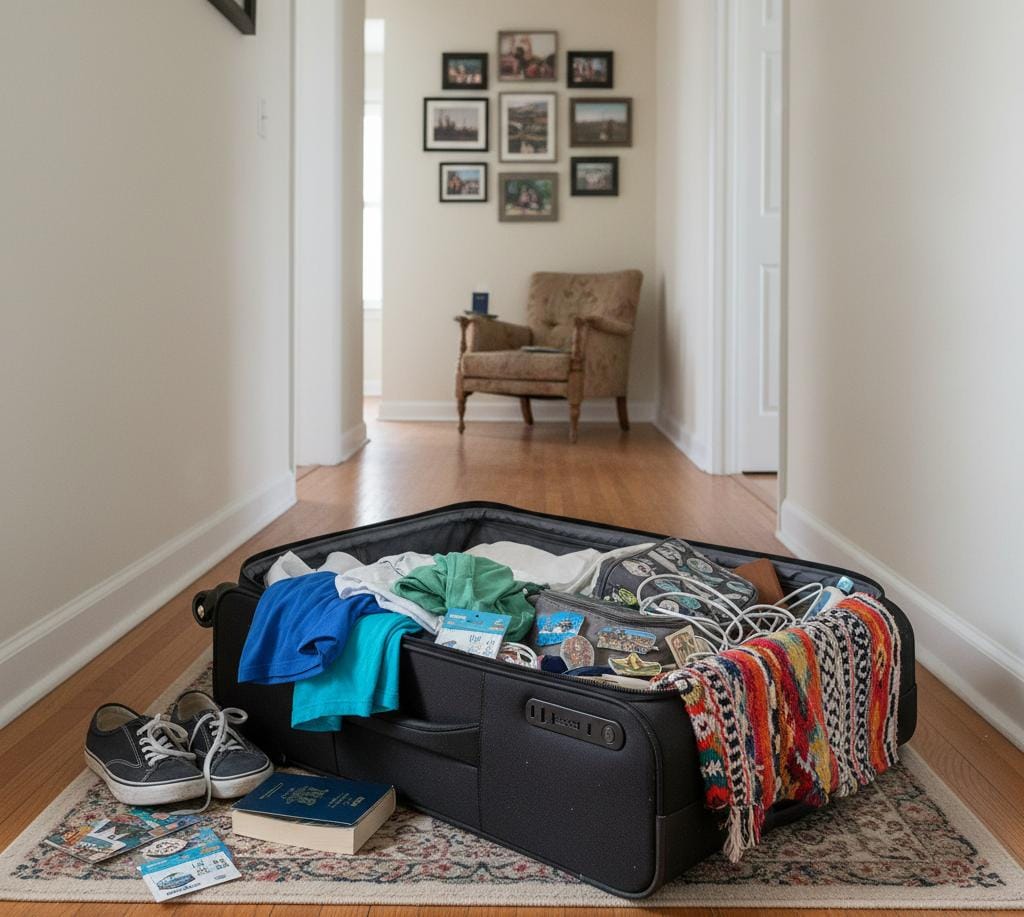
The sight is quite familiar. You have returned from this amazing trip full of fun, new experiences, and memories. The adventure is now over. You are home. But your suitcase is still living rent-free in the hallway.
The bulky reminder of your journey remains closed. A day passes, then two, before you know it, it is over a week, and the suitcase becomes a part of the furniture due to procrastination.
Planning for a trip and the packing is done carefully, but the moment we get home, putting away everything feels like a tiresome chore. This is a common scenario for most travellers.
But why do we do it? Why do our suitcases, filled with laundry and souvenirs, become a looming presence in our homes?
The answer lies in a fascinating mix of psychological and emotional reasons, from post-vacation blues to the symbolic meaning of the suitcases to the deep-seated desire to avoid the inevitable return to routine.
The psychological roots of unpacking avoidance
This avoidance is not a simple case of laziness. It is more of a behavior with deep psychological roots. It is often a manifestation of the post-vacation blues, holding onto he symbolism of the suitcase, and the overwhelming feeling that comes with the post-travel to-do list.
i) Post-vacation blues
This is the feeling of sadness or letdown. It is a natural response to the abrupt end of a period of heightened excitement.
With unpacking being the final tangible act that signals the end of the vacation and the return to routine, the post-vacation blues creep in. This final, undeniable act signals the full return to the mundane routine of work, school, and daily responsibilities.
To avoid this feeling, one would ignore the luggage, postponing the unpacking eventually.
ii) Symbolism of the suitcase
The suitcase itself holds a powerful symbolic weight. It is a literal time capsule of the trip. By leaving it untouched, we unconsciously keep a part of the adventure "alive". Opening the suitcase to unpack feels like closing a cherished book, putting the story of the vacation to an end.
With this lingering in the back of your head, you eventually end up deciding to leave the suitcases "chilling" in the hallway.
iii) The overwhelming "To-Do" list
Unpacking feels like a daunting task after the mental and physical exhaustion of navigating airports, different time zones, and new environments.
The reluctance to unpack is amplified by the overwhelming tasks one has to do post-travel. Adding unpacking to an already long list of tasks to do makes it seem like a whole chore; therefore, postponing it or making it a task we would rather avoid.
Emotional dimension of unpacking
The act of unpacking is also deeply rooted in our behavioural and emotional tendencies. Majorly, it is a classic case of procrastination and task avoidance, or a significant emotional hangover at play.
i) procrastination and task avoidance
Unpacking is often perceived as a tedious and low-priority chore. This leads to the "it can wait" mentality, making it seem less urgent than other post-trip responsibilities. As a result, the task is continually pushed to the bottom of the to-do list.
ii) emotional hangover
Leaving the suitcase packed allows us to hold on to the last remnants of our trip/vacation. The suitcase serves as a physical reminder that we are not entirely back to our daily routine. It's more of an emotional security blanket when we are unwilling to fully close the chapter on our adventure.
Case study: Why do you delay /avoid unpacking?
To understand this, I interviewed two individuals (male and female) on why they delay or avoid unpacking
Question: After a trip, how long does your suitcase typically sit unpacked? What's the longest it's ever stayed lingering, unpacked?
Female interviewee: Typically, I'd say a week.The longest, maybe one or two months.Male Interviewee: It will stay unpacked until I need something from my bags. And it's not like I unpack it completely, I'll just get what I need from the bags.
Question: Have you ever felt a sense of sadness or "post-vacation blues" upon returning home? How do you think this feeling is connected to the task of unpacking?
Male interviewee: Not sad really, but in some type of way, I don't know how to explain it.Female interviewee: Yes, I do. Mostly it's laziness
Question: When you look at your packed suitcase after a trip, does it evoke feelings of nostalgia, and does keeping it packed allow you to hold onto that feeling for a little while longer?
Female interviewee: Yeah, it does.Male Interviewee: Yes, because the trip was fun, everything was nice, from the accommodation to the activities.
Question: When you get home, what are the first things you prioritize? Where does unpacking fall on that list of post-travel tasks?
Female interviewee: Showering and changing into new clothes. Unpacking is not on the list of prioritiesMale Interviewee: Getting my daily essentials, like my toothbrush, toiletries, from my bags. I don't unpack my clothes because they're dirty. I unpack them when I feel like doing laundry.
Question: Have you ever tried to change this habit? What strategies have you used to motivate yourself to unpack sooner?
Female interviewee: Not reallyMale interviewee: Well, I have never tried to change this because the clothes in the bags are dirty. If I unpack my bags, where will I put them when my laundry basket is already full?
Question: In your opinion, what would make the process of unpacking feel less like a chore and more like a positive final step of the journey?
Female interviewee: Maybe having someone who'll help me do it. I'm alone, I think that's why I delay unpackingMale Interviewee: Only if I have no more clothes to wear. If all my clothes are dirty, I'd definitely have to unpack.
Psychologist's point of view
"Unpacking may represent an ending, and one may unconsciously delay it as a way to avoid the feelings associated with that ending. When we do this, it is in denial that the trip is over. We procrastinate unpacking and view it as a chore to delay going back to our normal routine," said a Psychology graduate.
Practical consequences of unpacking
Unpacking leads to physical clutter and disorganization. A suitcase in the living space creates visual clutter, leading to a disorganized home and a feeling of chaos.
It also becomes difficult to pack for a new trip when the old suitcase is still full. As a result, the cycle of procrastination continues.
Furthermore, functionality is lost, clothes become wrinkled and musty when left in bags and suitcases.
Overcoming the unpacking chore
Acceptance that the trip is over is essential. Acknowledge the emotional connection to the trip and frame unpacking as a final act of the vacation and not an end.
Set up strategies such as unpacking one category at a time. You can decide to unpack just laundry, then toiletries. You can set up a timer and start while incorporating things you enjoy, such as music, a podcast, or a favourite show, while you unpack.
Alternatively, you can decide to unpack immediately upon arrival, before the emotional slump sets in. Add on a reward for yourself upon completion to make it an even more pleasant experience.
Conclusion
An unpacked suitcase is more than just an object. It is a window into your psychological and emotional state. With post-travel exhaustion, the desire to preserve a symbolic piece of your journey, and the natural human tendency to procrastinate, we avoid this simple task. We hold onto the last remnants of our vacation as unpacking represents the end of the trip.
But in doing so, physical clutter is created, which can lead to mental chaos that would prevent us from going back to the reality that we're creating a mess.
Unpacking is more than a chore; it is a healthy ritual that helps transition back to reality while appreciating the new memories we have created. It's also a preparation for the next adventure.
So, the next time you find yourself leaving your luggage "chilling" rent-free in the hallway, remember you are not letting go of the memories but creating room for your next adventure, and unpack that suitcase.
















